Apple AirPods Pro vs. Sony WF-1000XM3: Which wireless noise-cancelling earbuds are best?
It's the clash of the noise-cancelling titans with our AirPods Pro vs Sony WF-1000XM3 face-off.
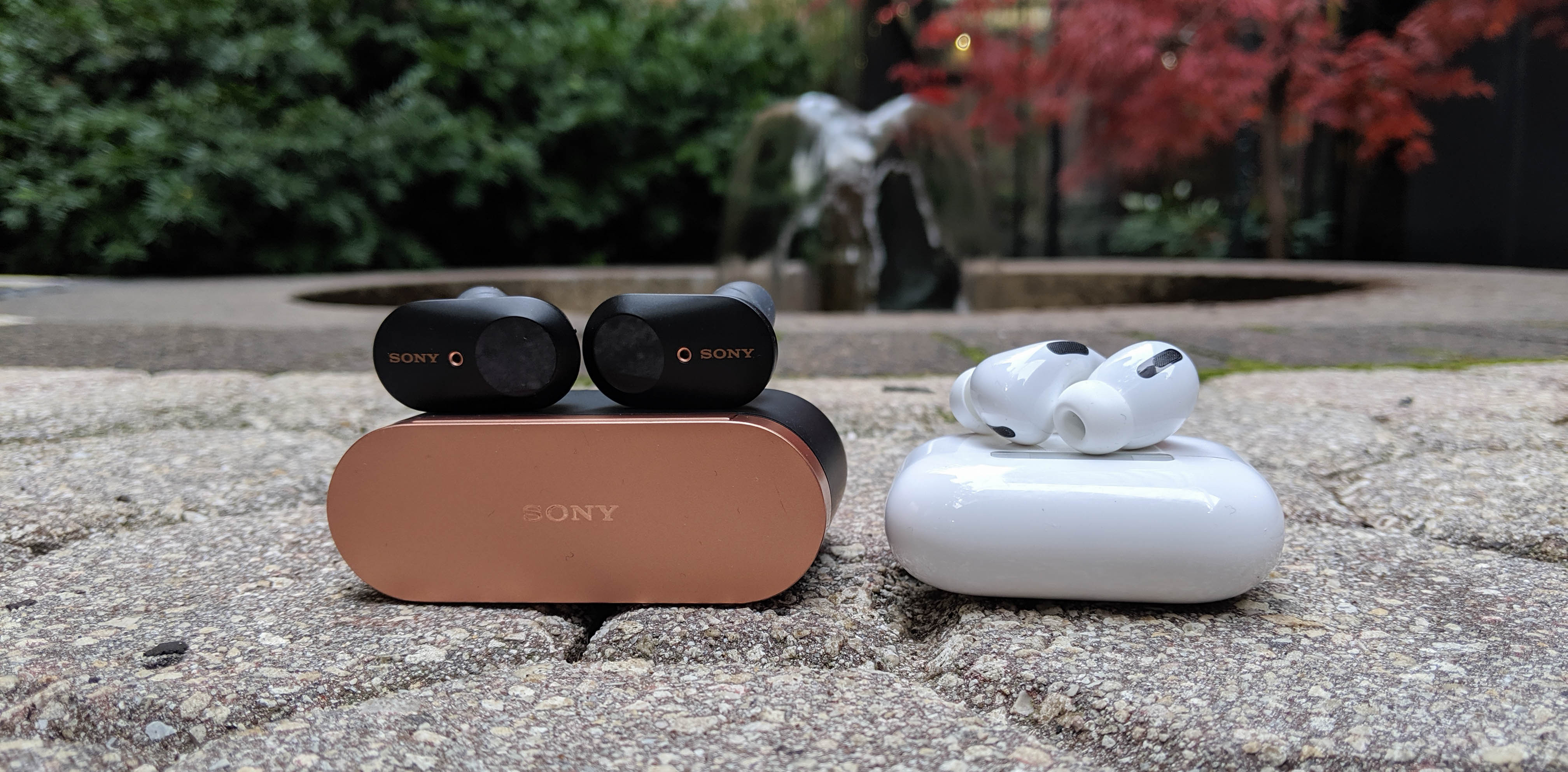
While the options for true wireless earbuds with active noise-cancelling are scant, it turns out the only two legit options also happen to be two of the best in the category. Those two are the AirPods Pro and Sony WF-1000xM3.
Sony’s buds came out of the retail gate first, and while met with great critical reception upon launch, only recently have they garnered attention as the potential AirPods Pro killer. In the meantime, Apple’s high-end earbuds have become ubiquitous, and have set a precedent in the true wireless category with the reviews to back up their surmountable hype.
Great sound, even greater noise cancellation, and plenty of features that bring forth a unique listening experience: exactly which buds are we talking about here? It’s time to pit the AirPods Pro vs the Sony WF-1000xM3 to determine the true class leader.
AirPods Pro vs. Sony WF-1000xM3: Specs compared
| Header Cell - Column 0 | Apple AirPods Pro | Sony WF-1000xM3 |
|---|---|---|
| Price | $249.00 | $228.00 |
| Wireless Charging Case | Yes, included | No |
| Chip | H1 | QN1e |
| Rated Battery Life | 4.5 hours (24 hours with charging case) | 8 hours (24 hours with charging case) |
| Water Resistant | IPX 4 (can withstand sweat and water, but not for use in water sports) | No |
| Case Size | 1.78 x 2.39 x 0.85 inches | Undisclosed |
| Case Weight | 1.61 ounces | 2.8 ounces |
| Special Features | Active noise cancellation, transparency mode, adaptive EQ, customizable fit, audio sharing, announced messages with Siri, “Hey Siri” voice-activated assistance | Active noise cancellation, transparency mode, companion app with customizable EQ, DSEE HX upscales compressed digital music files, NFC connectivity, touch controls |
Design
Sony headphones are some of most attractive in the audio space. The WF-100xM3 is in good company and looks far better than Apple’s pearly danglers. It’s all in the details here, as the copper accents and circular touch panels at the edge of each earbud provide a nice balance between classy and contemporary. The plastic casing feels solid and secures all of the high-powered internals that Sony stuffed into the buds. An accidental spill to the ground won’t break them. Sony also sells the WF-1000xM3 in two colors: Black and Silver.
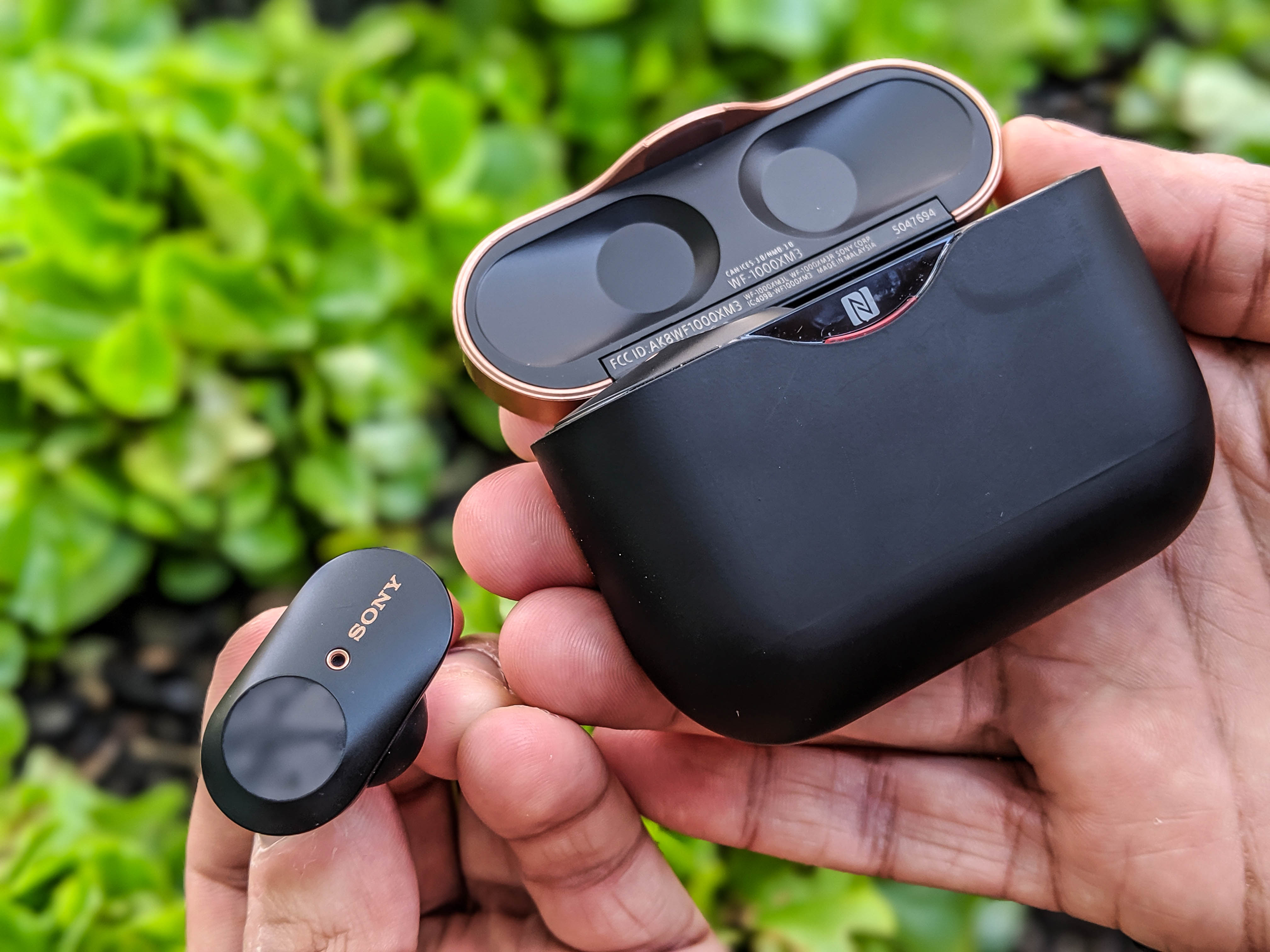
The charging case might be on the larger side, but even so, it still looks hot. Sony clearly found inspiration for its design from classic EDC items; it almost looks like a fancy cigarette holder when held on its side. The aluminum lid gives the case a nice shine in bright settings, while the rubberized coating feels great in hand and takes on scuffs well.
The AirPods Pro look identical to their predecessor: ugly. Some changes were made to the design like integrated ear tips, black microphone vents, and shorter stems. Apple did make the buds sweat- and water-resistant. Look closer and you’ll also see the sound ports are longer, which allows the buds to easily slide into your ears. Lastly, the company made the buds from eco-friendly parts, which we commend them for.
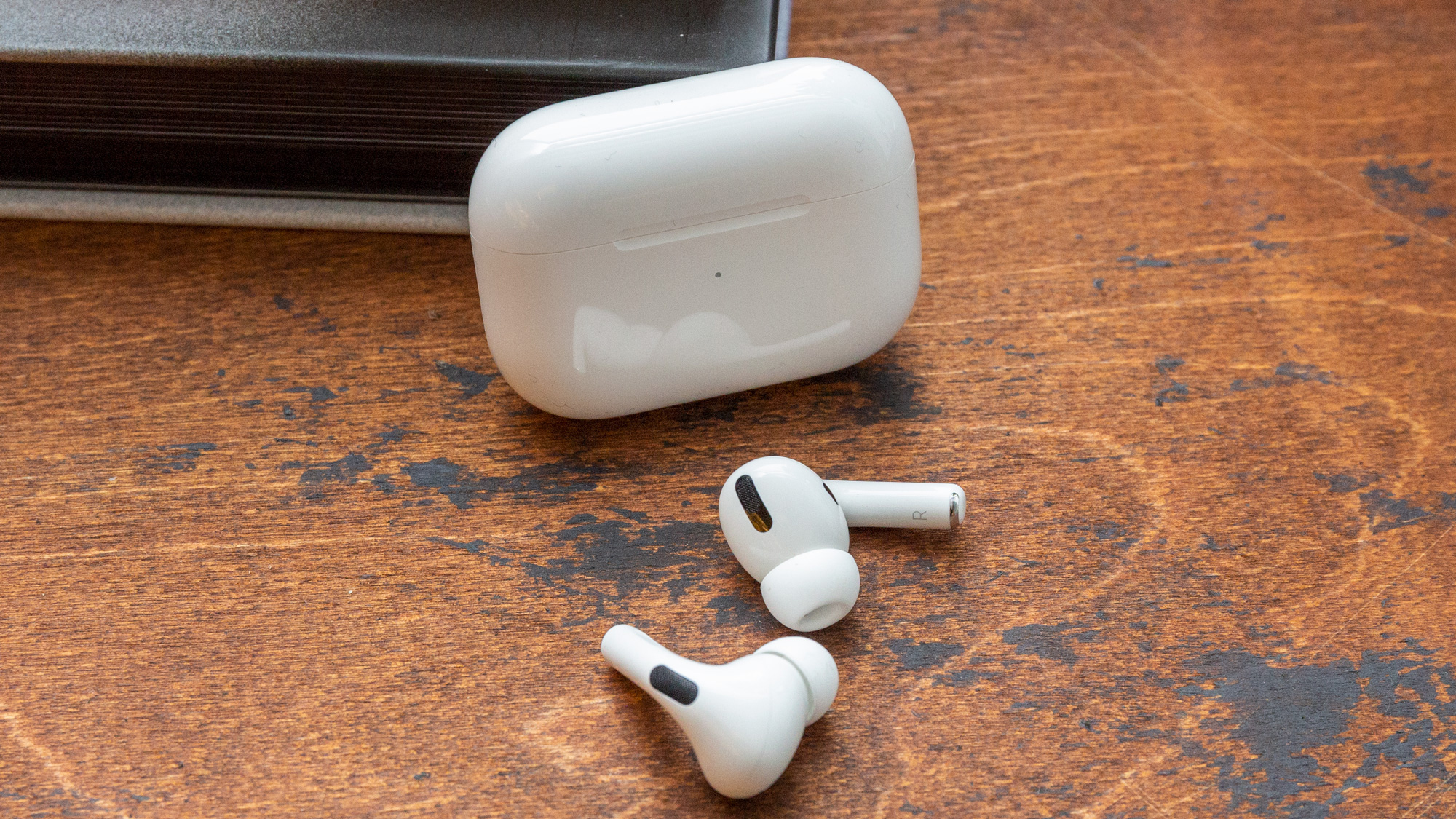
Apple did make the charging case wider to accommodate the buds’ new form. It’s still small and portable. At the same time, it doesn’t offer the best protection. One drop to the floor will scuff up the case and send the buds sliding everywhere; the lid doesn’t shut securely. Another knock against the AirPods Pro is the lack of colors – we’ve been over “Apple White” since the original EarPods.
Winner: WF-1000xM3
Comfort
Despite their awkward design and shape, Apple’s buds rest comfortably on the concha and offer a snug, secure fit, thanks to the tips. They develop a tight seal around the ear to keep them in place when moving at a face pace. I wouldn’t recommend them for working out, but for those who love to go against the grain, especially after spending hundreds on replacement Pods in the past, you’ll find the AirPods Pro to be a safer wear on outdoor runs than the previous models.
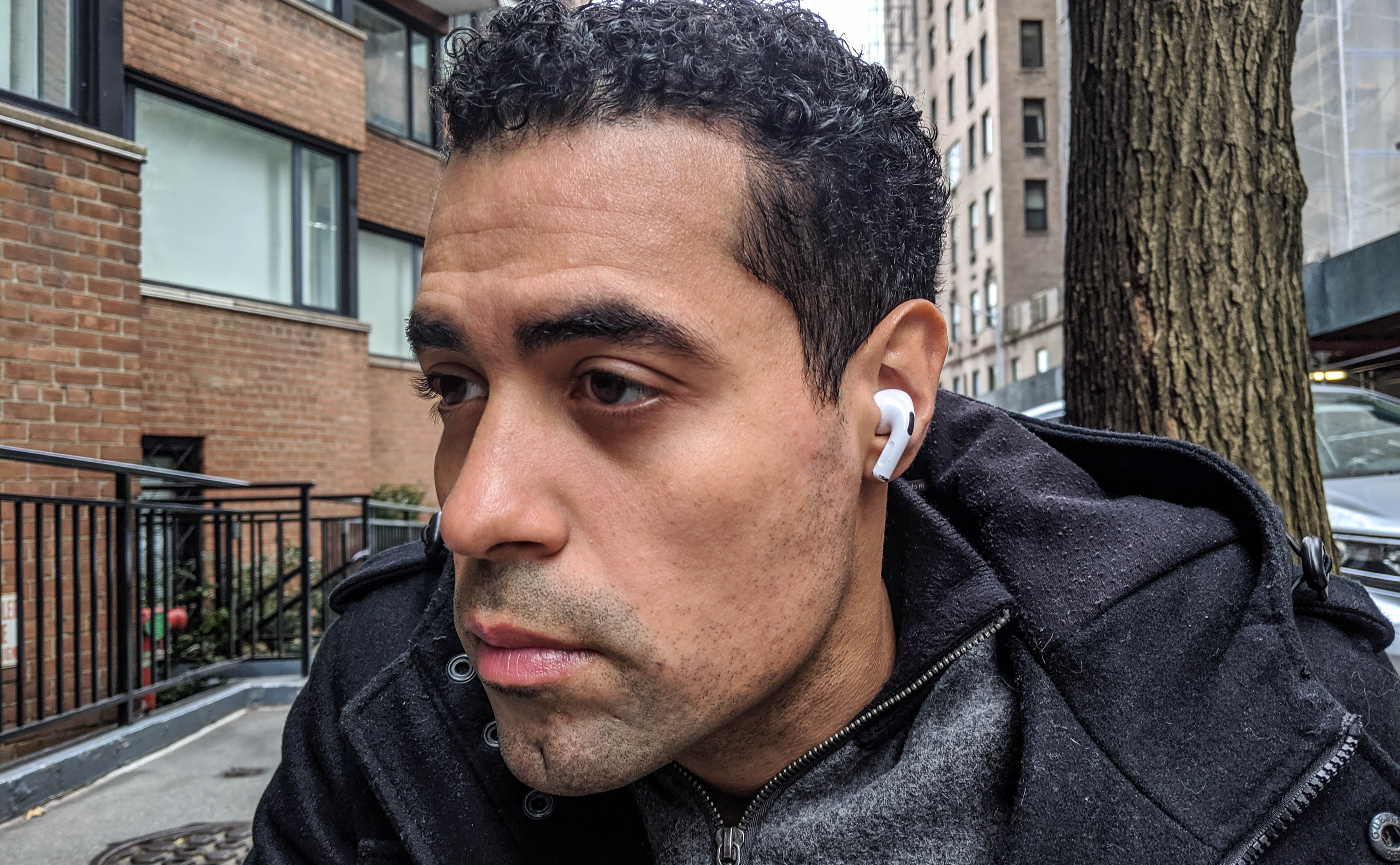
Apple also developed an Ear Tip Fit Test to better determine the best tip size for users. You can access it by going into the buds’ settings. Once enabled, the program will play a song and analyze how the sound hits your ear canal to suggest the best fit. It’s very helpful.
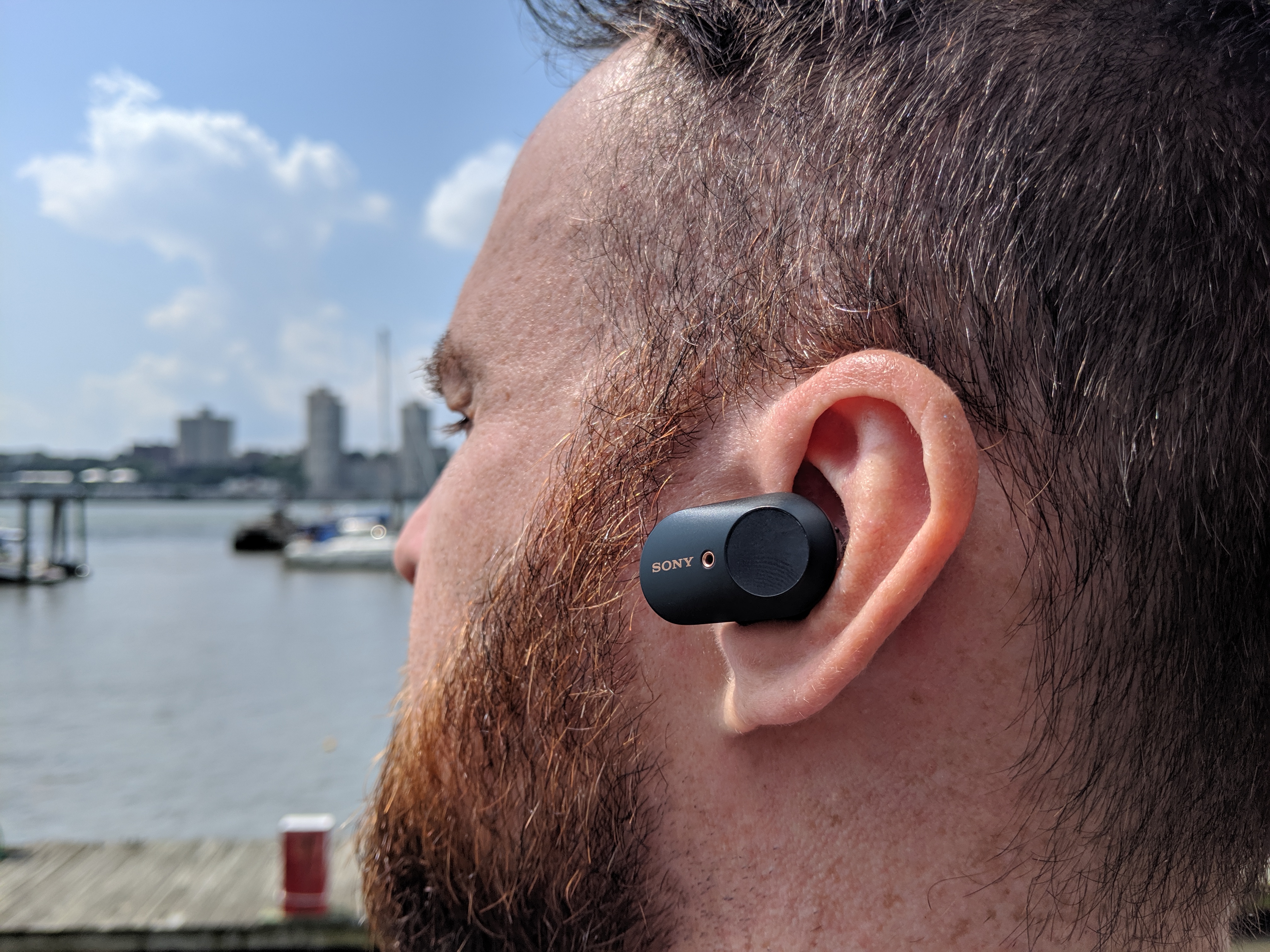
The WF-1000xM3’s elongated form makes the buds an uncomfortable wear. You’ll need to adjust them properly or they’ll slip out little by little; tilting your head one way causes them to fall out completely. A simple twist helps lock the buds in place, but it doesn’t always work. They also stick out, which is something many fashion-forward smartphone owners will frown upon.
Winner: AirPods Pro
Controls
Apple switched things up by replacing the AirPods tap gestures with pinch gestures. Each bud has a haptic force sensor placed at the bottom of the stem that is identified by a small indentation. Pressing it will produce a click sound that confirms your intended commands: one pinch plays music, two skips a track, three skips back a track, and a long pinch enables ANC/Transparency Mode. It takes a bit of getting used to, but the controls are responsive.
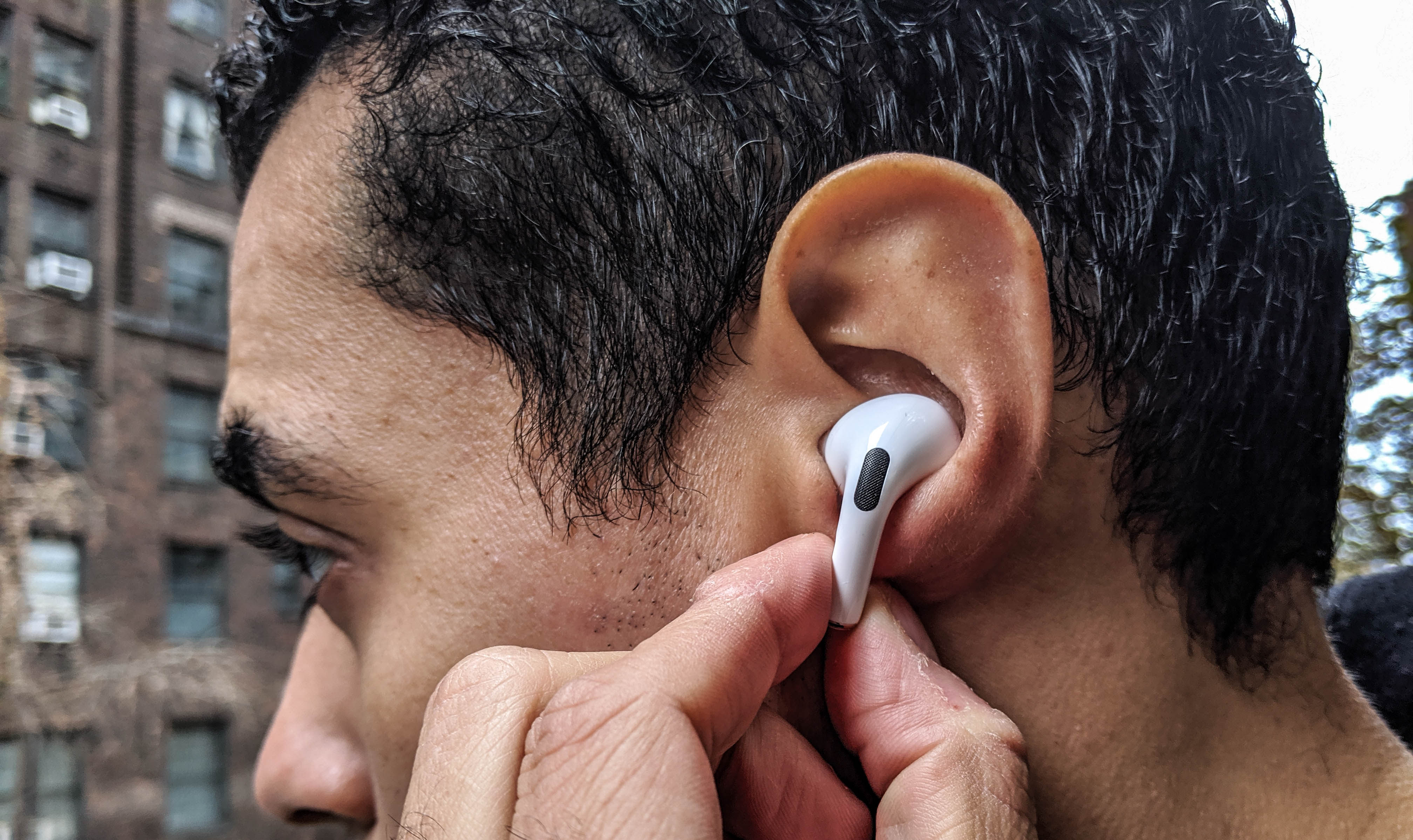
Sony’s track record with touch controls was impressive until the WF-1000xM3 was released. The touch panels fail to register taps accurately. It was through a bit of trial and error where I realized that slide gestures worked better, making it easier to manage playback and noise cancellation.
Both models have on-ear detection, so you can pause music when removing the buds from your ears. Putting them on resumes playback. The feature works better on the AirPods Pro; Apple’s movement detection is spot-on. I can’t say the same for the WF-1000xM3, which struggled to register movements and oftentimes continued playback after being placed on a surface.

Something else worth noting is the AirPods Pro and WF-1000xM3 don’t have on-board volume controls. Translation: You’ll need to adjust volume manually through your audio device. As a workaround, Apple does let you customize the controls to access a volume slider.
Winner: AirPods Pro
Noise Cancellation
Sony has made great strides with its noise-cancelling technology; the over-ear WH-1000xM3 remains the best Bose alternative out there. The company’s first two ANC true wireless models –the WF-1000X and WF-SP700N – failed to meet expectations. However, the third time proved to be the charm, and the WF-1000xM3 isn’t just the upgrade we’ve been waiting for – it’s also a better noise neutralizer than the AirPods Pro.
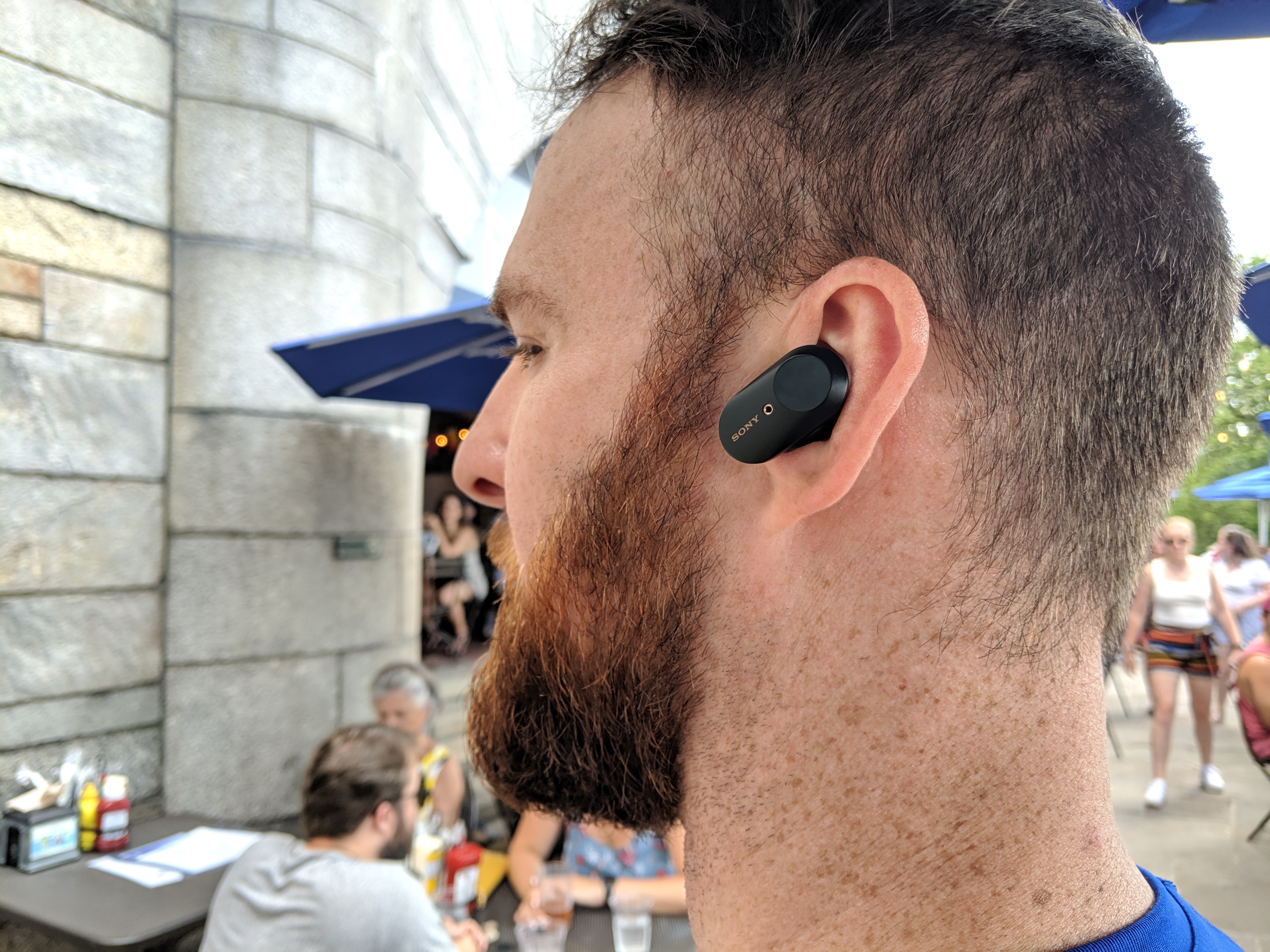
The WF-1000xM3 is powered by the HD Noise Canceling Processor QN1e, which is coupled with both feed-forward and feed-back mics to cancel out ambient noise across different frequencies. ANC performance is resiliently effective. It felt great walking on the subway platform without being disrupted by rowdy commuters or the clickety-clack noises of the train on the track. The feature worked so well that I didn’t even notice my train pulling into the station until I looked up at a sea of passengers exiting the car.
That being said, the technology isn’t perfect, so don’t expect complete silence during commutes. Crying babies will still make their presence felt from up close, although the feature brings their level of loudness down a notch. I also managed to hear car horns and sirens from a block away, but they sounded so distant that I just acted as if they were background effects on hip-hop songs. What matters most is that the buds minimize background noise as much as possible, which it does remarkably well.

Apple’s first foray into active noise cancellation is also noteworthy. The two-mic noise-cancelling system is a solid performer that blocks about 85% of ambient sound, which is way more than you can ask for from any Apple buds. They’ll help with hushing chatty Uber drivers and garbage trucks coming down pothole-filled streets. A jackhammer or police sirens will serve as distractions. It’s still really good, but Sony has more ANC horsepower underneath the hood to warrant better results.
Winner: WF-1000xM3
Audio
Here is another category where the processor factors heavily into performance. The QN1e chip gives Sony’s buds a sonic edge that the AirPods Pro can’t match. Bass has always been the driving factor behind Sony headphones, so it’s no surprise that the WF-1000xM3 has lots of boom. What is surprising is how well balanced the low end is on here.
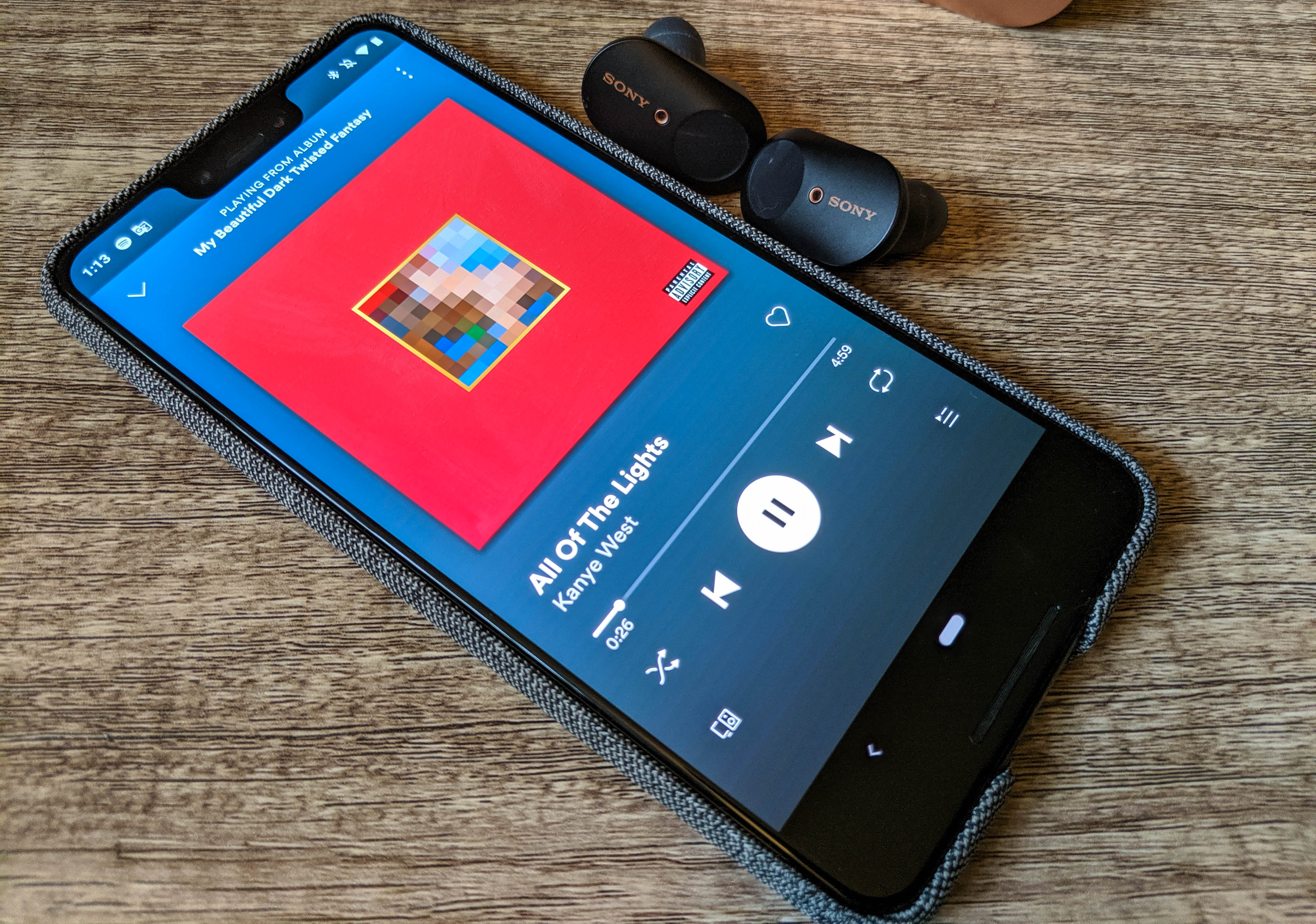
The blaring horns and hard-hitting drums on Kanye West’s “All of the Lights” sent a rush of adrenaline through my ear canal. Switching over to the Treble Boost setting in Sony’s companion app elevated the mid-range and emphasized the layered vocals, which made it easier to distinguish several of the singers on the recording.
Going the more melodic route, I pulled up Chicago’s “If You Leave Me Now” from my digital catalog via Apple Music and was shocked by the level of clarity. That’s because the WF-1000xM3 utilizes Sony’s proprietary Digital Sound Enhancement Engine HX, which upscales compressed files to produce hi-res audio. Highs were no longer masked, and every plucked string was reproduced beautifully.
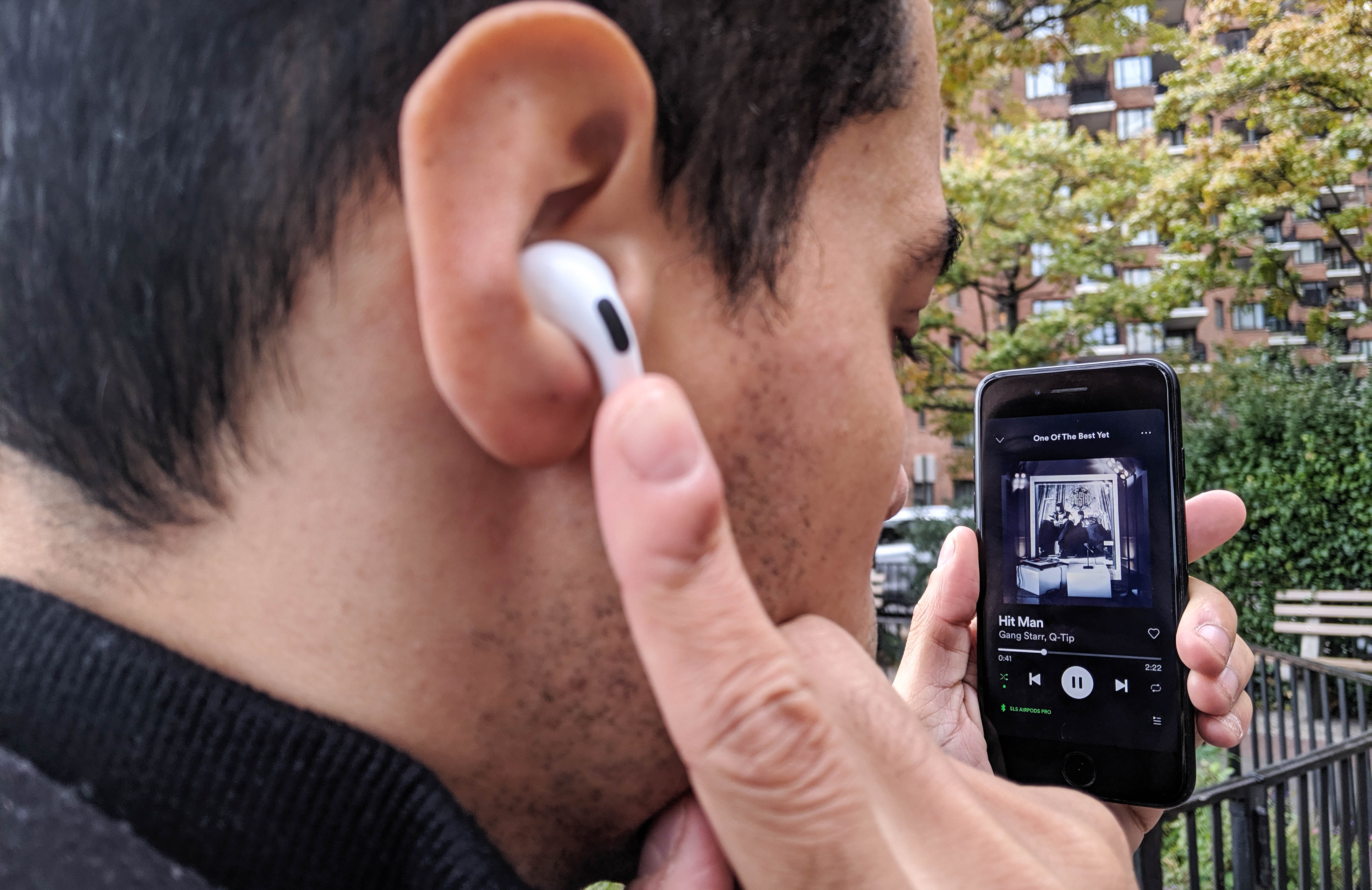
The AirPods Pro are also quality-sounding buds. Not as great as the WF-1000xM3, but their sound profile is a notable upgrade from the AirPods II. Boomy records like Gang Starr’s “Hit Man” sound energetic and carry lows surprisingly well; that bass line knocks hard, especially at high volume. Sound quality takes a slight dip when venturing into orchestral-heavy recordings. The drums and percussion on Quincy Jones’ “Soul Bossa Nova” didn’t carry much punch.
Winner: WF-1000xM3
Special features and apps
You should never underestimate the value of a custom EQ, and the fact that Sony provides listeners access to one gives the WF-1000xM3 this round. The Sony Headphones app has this in the middle of the home screen, along with several other features.
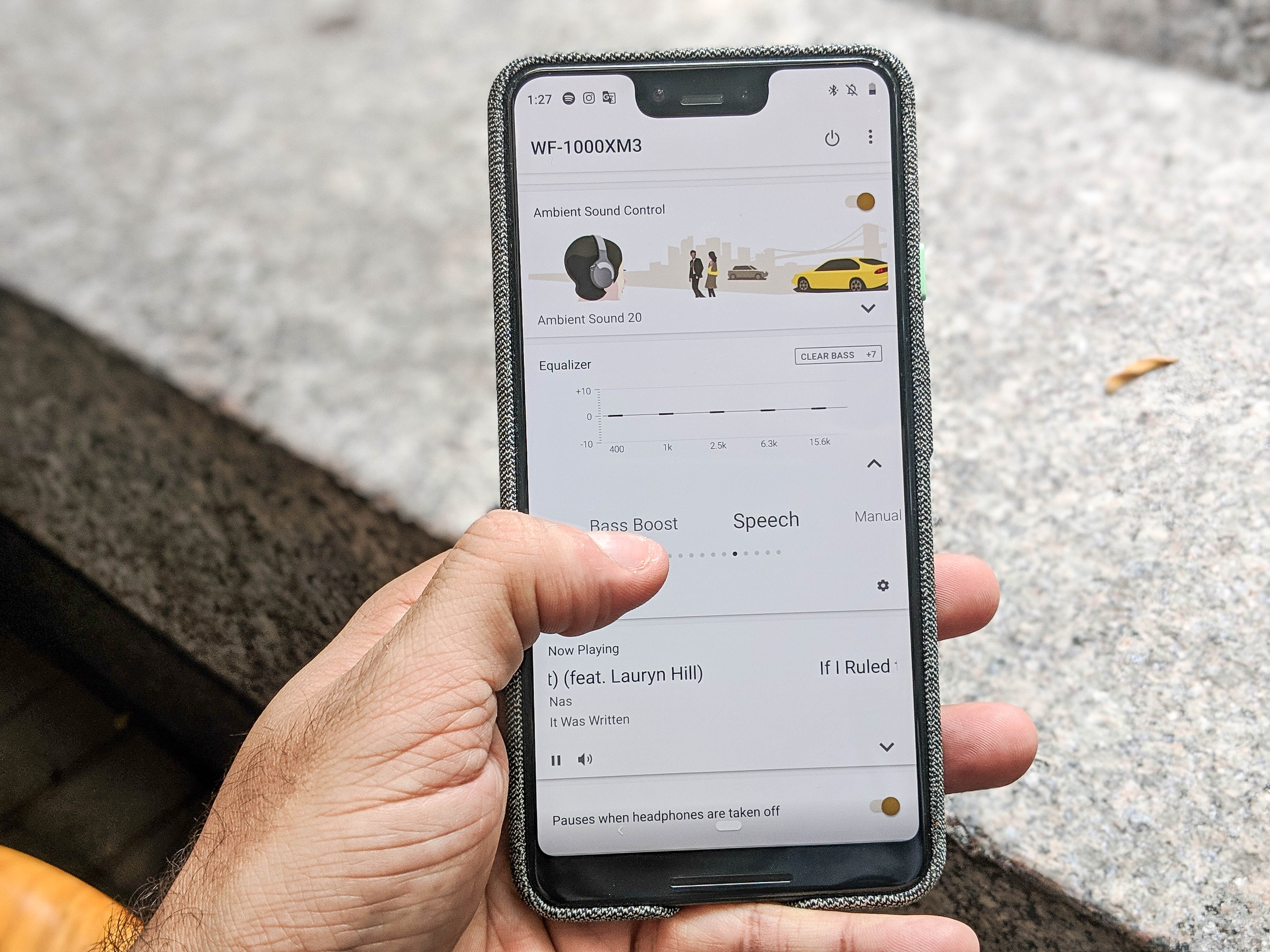
You can create sound profiles or select different presets: Bright, Excited, Mellow, Relaxed, Vocal, Treble Boost, Bass Boost, Speech and Manual (aka default). Each one caters to specific genres and elevates the sound quality, although I found the Manual perfect on its own. There is also a Sound Quality mode that lets you choose between prioritizing sound or connectivity; the latter is recommended for when dropout happens consistently. You can also assign the controls on each earbud, push firmware updates, and toggle switches for listening modes.
Apple’s H1 chip offers its own bells and whistles that optimize performance on the AirPods Pro. It improves audio latency, battery management (50% more talk time), and Bluetooth connection. Where the buds really stand out is in hands-free operation. The voice activated “Hey Siri” feature works flawlessly, while new features like Announce Messages make receiving incoming messages a breeze by having Siri read them off. There is even an audio share option to share music from an iPhone to two pairs of AirPods or Beats headphones.
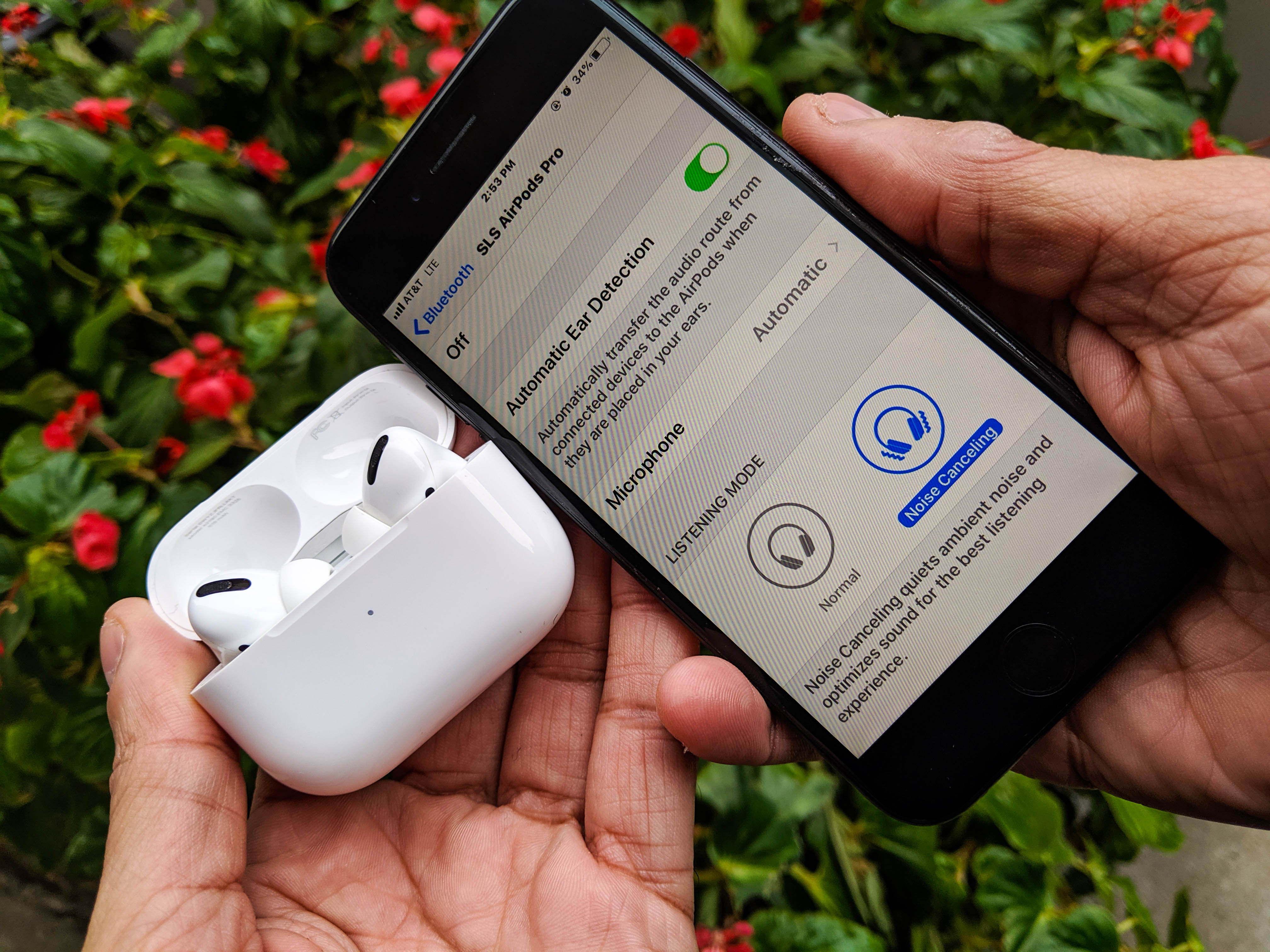
Each device has its own hear-through listening mode: Ambient Sound Control (WH-1000xM3) and Transparency (AirPods Pro). They work similarly, opening up the soundstage to allow in noise for environmental awareness. Both work great, though I would give the advantage to Sony since you can adjust the ambient levels via slider and allow in as much noise as you want.
Winner: WF-1000xM3
Call quality and digital assistant
Great call quality has remained a hallmark for the AirPods, and it’s even better on the third-gen version. Apple’s noise-cancelling mics allow you to hear calls loud and clear by minimizing background fracas. The tight seal created by the tips improves clarity, preventing outside noises from seeping into your ears during wireless chats. Wind resistance is where the AirPods Pro really shine; I screened calls in drafty conditions without any interference.
With such great noise cancellation technology, one would figure the WF-1000xM3 to be a great calling headset. Lower your expectations, drastically. The several callers I spoke with complained about my voice dropping every few seconds, along with some muffling on my end when chatting in high-volume areas. Something else you might encounter is the mic randomly muting when picking up calls, though the latest firmware update seemed to fix that problem.
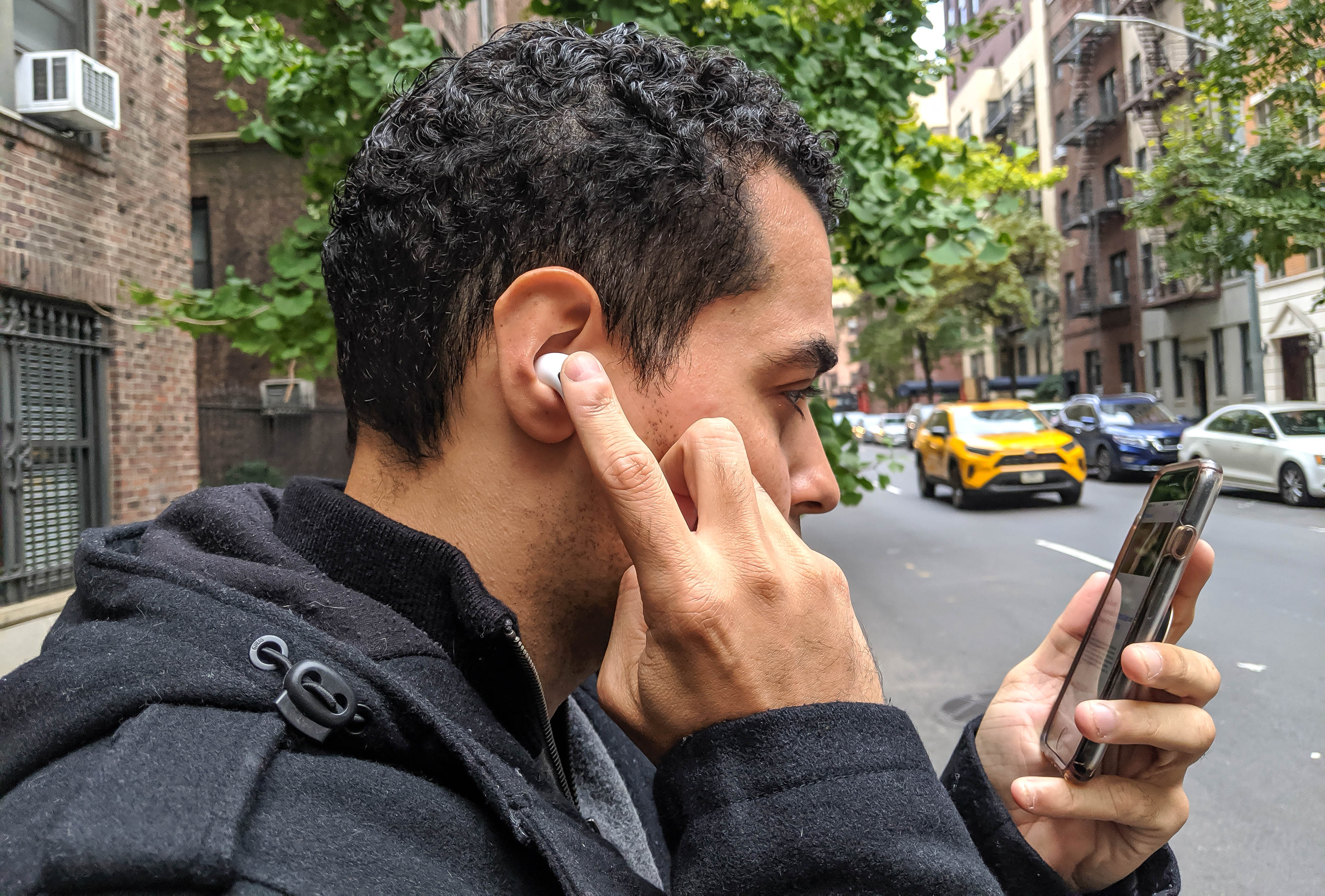
The digital assistant feature works great on these two devices, but nothing compares to the hands-free performance that Apple provides. The “Hey Siri” feature works without a hitch across iOS devices, while triggering Siri manually on any MacBook spits out fast, spontaneous results. Since the AirPods Pro are compatible with Android devices, you’ll have access to Google Assistant as well, but you lose out on all Siri functionality.
The WF-1000xM3 also supports Google Assistant and Siri, though the former is better suited for these buds. Sony’s mics demonstrate great speech recognition, while Google’s software does an even better job registering commands to produce instant results.
Winner: AirPods Pro
Charging case
Each charging case features a 24-hour battery, compact design, and magnetic interior that keeps the buds locked in. What makes one better than the other are two specific hallmarks: portable convenience and wireless charging. These are where the AirPods Pro come up big time.
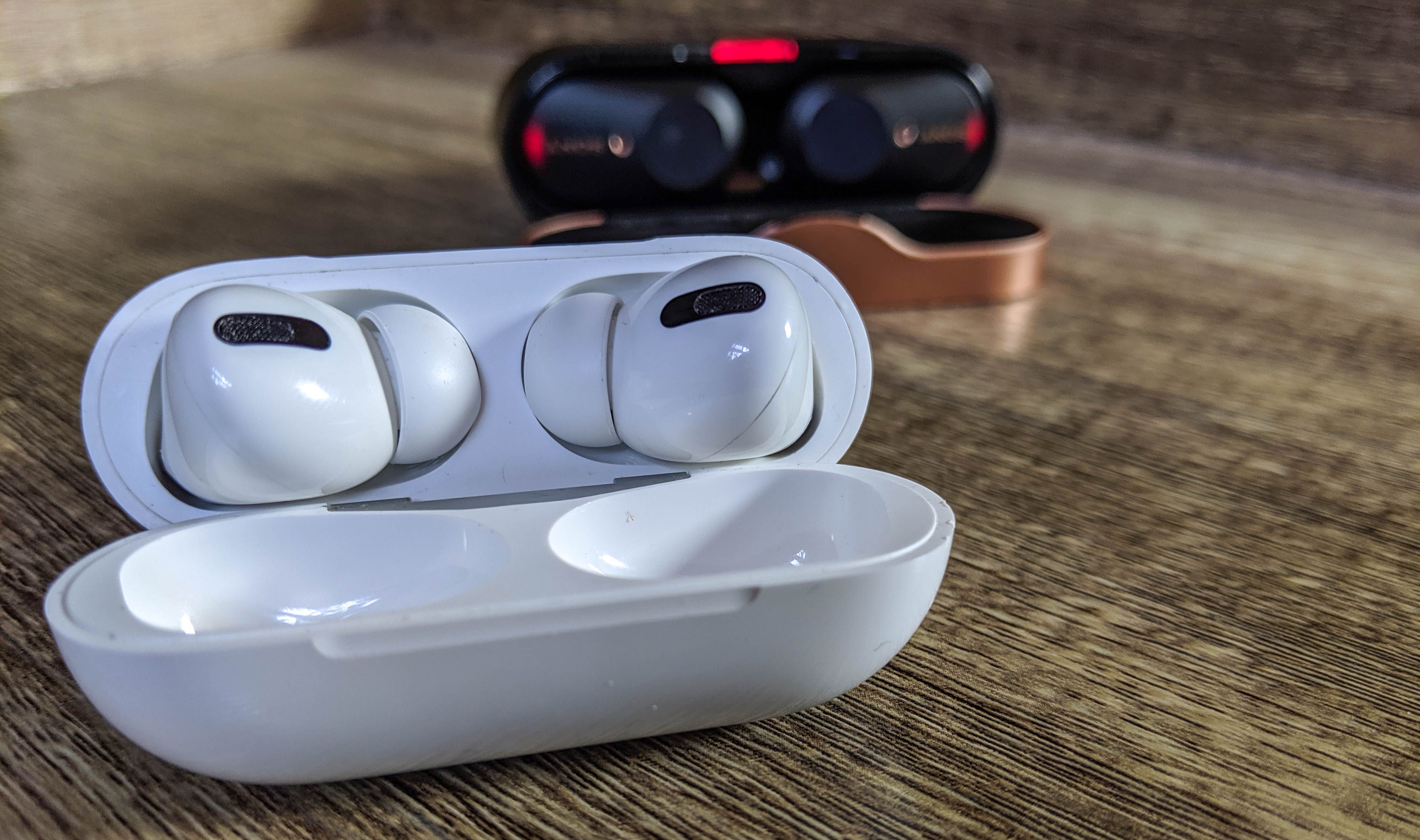
Even with Apple’s case being slightly bigger and heavier than the previous version, it’s much easier to carry around than Sony’s case. Having five extra charges is also clutch for iPhone users who find themselves needing to juice up the buds after a half day of use. It’s also a luxury to wirelessly charge the case via Qi-compatible chargers without being tethered to your wall charger.
Sony’s charging case is too bulky to squeeze in most denim pockets and weighs down your pants. It is programmed with NFC, so you’re able to instantly pair the buds by placing your Android phone on top of the case, but it’s a niche feature that very few people use or even know about. Truth be told, we would rather have wireless charging.
Winner: AirPods Pro
Battery life
ANC sucks up a lot of juice no matter what style of headphone or earbud. To see the WF-1000xM3 hold a charge for up to 8 hours (6 hours with ANC on) is awesome. It’s a sufficient amount to enjoy music and calls for 3-4 days on moderate use before tossing them in the case. Those who constantly forget to recharge their buds can find solace in knowing a 10-minute quick charge nets them 90 minutes of listening.
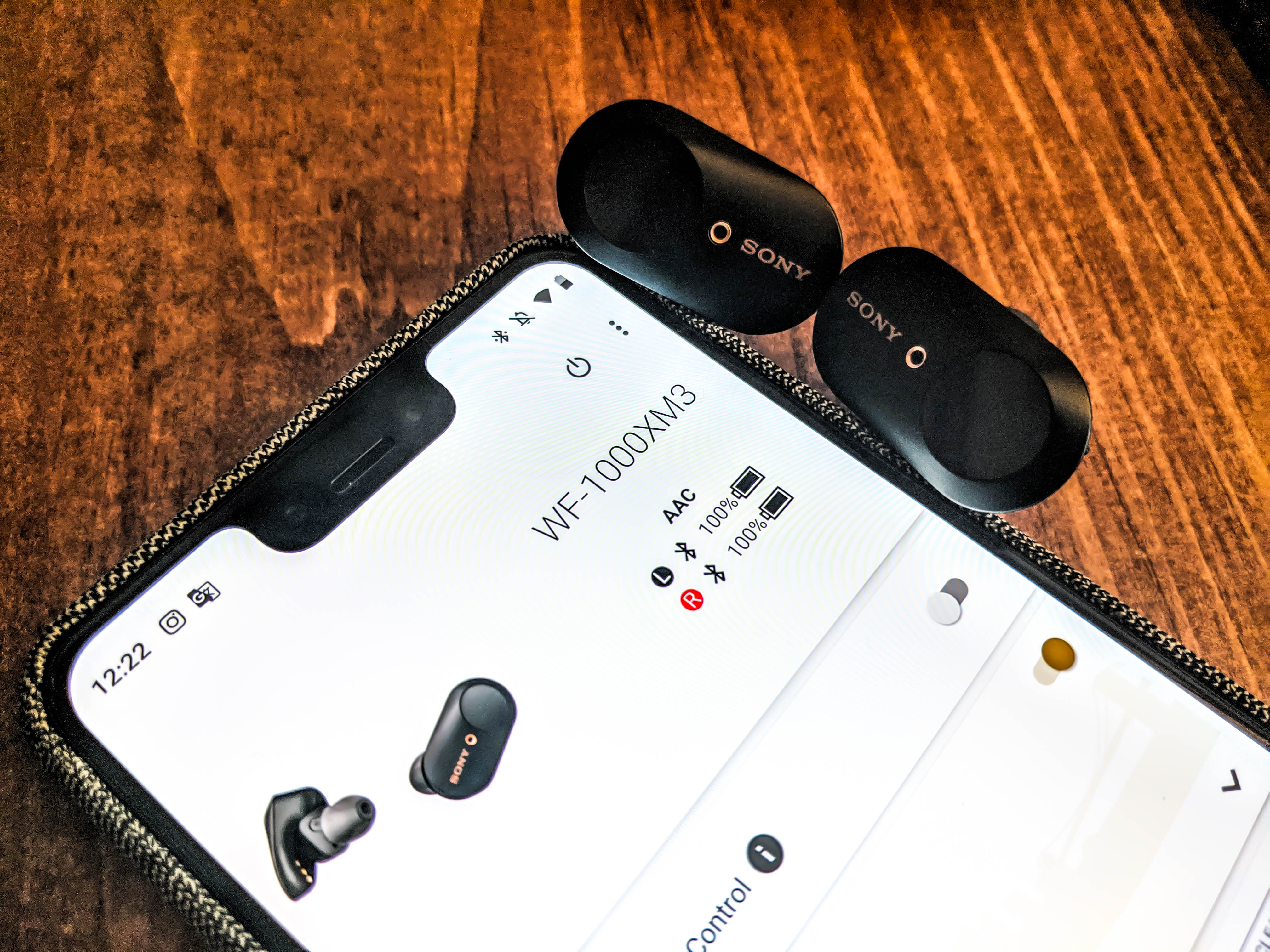
We’re going on the third generation of AirPods and Apple has yet to fix its low battery issue. Not only do the AirPods Pro carry half the battery life of the WF-1000xM3, but they’re actually rated a half-hour lower than the AirPods II: 4.5 hours. Considering all of the new circuitry underneath the hood, I was surprised to see these buds last up to 4 hours on heavy use. They also support fast charging to generate an hour of listening time on a 5-minute charge. Still, there are numerous other models that surpass the AirPods battery life by several hours.
Winner: Sony WF-1000xM3
Price and value
Neither set of earbuds comes cheap. That’s the price you pay for premium true wireless earbuds, let alone those with active noise cancellation. The WF-1000xM3 is the cheaper of the two at $228, which is a steal considering its excellent ANC and sound quality. The $250 AirPods Pro are a bit steep, but an upgraded design and several new features justify their high price tag.
Winner: AirPods Pro
The AirPods Pro have the best overall performance in their class. Therefore, they’re considered the better investment for those who want solid audio and noise cancelling, along with all of the iOS perks programmed into the H1 chip. The ergonomic design and pinch controls enhance the user experience for the better. Also, the disparity in ANC performance isn’t that far off, meaning you’ll get some really good noise neutralization out of these cordless buds.
| Header Cell - Column 0 | Apple AirPods Pro | Sony WF-1000XM3 |
|---|---|---|
| Design (15) | 11 | 12 |
| Comfort (10) | 9 | 6 |
| Controls (5) | 4 | 3 |
| Noise Cancellation (15) | 13 | 14 |
| Audio (20) | 17 | 19 |
| Special Features and Apps (10) | 7 | 8 |
| Call Quality and Digital Assistant (5) | 5 | 3 |
| Charging Case (10) | 9 | 7 |
| Battery Life (10) | 6 | 8 |
| Total Score (100) | 81 | 80 |
Sony has Apple beat in the audio department with better active noise cancellation and sound; they really do a phenomenal job of filtering out unwanted noises. The WF-1000xM3 also has more meaningful features like an adjustable ambient-listening mode and customizable EQ. At the same time, the buds can act spotty at times, while their elongated form creates an unstable fit that makes sporting them on the go cumbersome. Again, they have the sonic and wireless prowess to compete and beat several of the category’s best – just not the AirPods Pro.
Sign up to get the BEST of Tom's Guide direct to your inbox.
Get instant access to breaking news, the hottest reviews, great deals and helpful tips.
A lifestyle journalist with an affinity for consumer products, Alex has over a decade of experience and has worked with popular publications such as Complex, Thrillist, Men’s Health, Gear Patrol, AskMen, and Hoop Magazine. He currently focuses on audio, reviewing the most coveted headphones in the market for both Tom’s Guide and Laptop Magazine.

